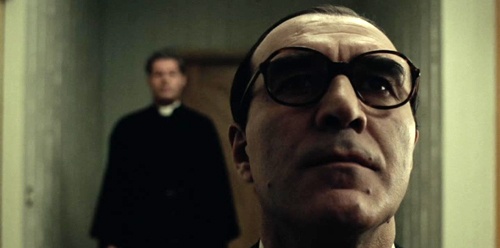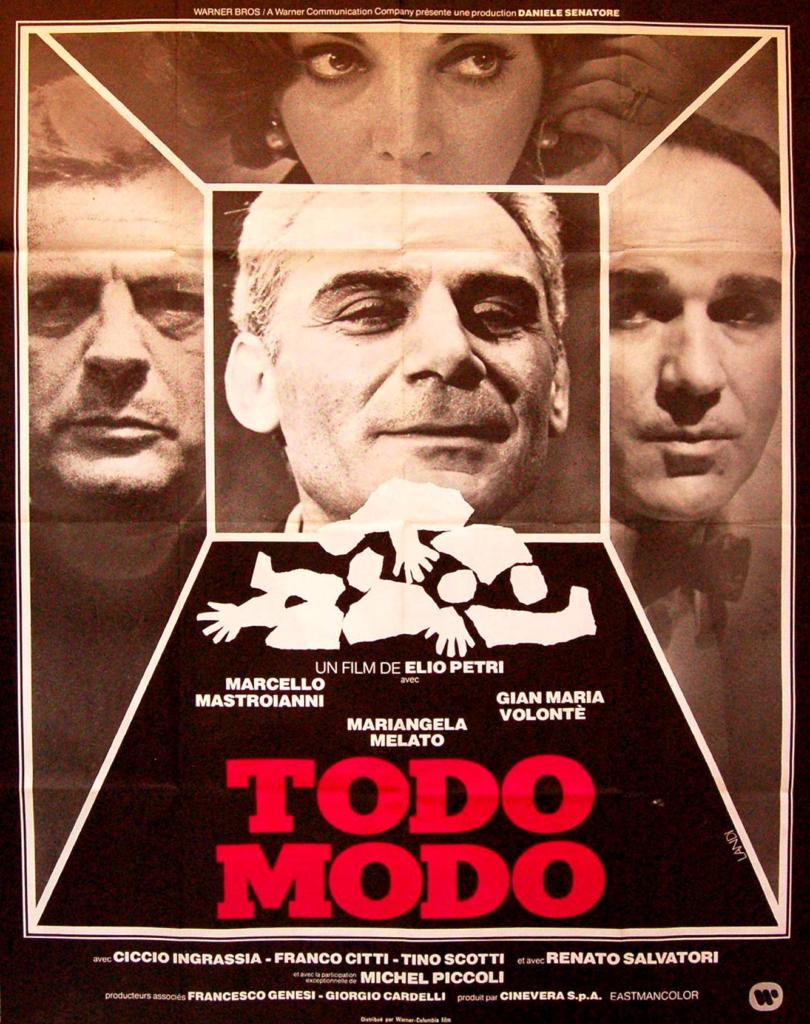
On April 30, 1976, Todo Modo was released in theaters, directed by Elio Petri. The subject by Leonardo Sciascia with the screenplay by Elio Petri and Berto Pelosso.
Among interpreters the great Gian Maria Volontè, Marcello Mastroianni, Mariangela Melato, Franco Citti, Renato Salvatori, Ciccio Ingrassia. The photograph is signed by Luigi Kuveiller while the music is by Ennio Morricone.
https://youtu.be/iKhznqDiW7s
“In the last period of my life I made unpleasant films in a society that now asks for pleasantness to everything, even commitment: if the commitment is pleasant, and therefore does not bother anyone, you accept it. Otherwise, no “My films, on the other hand, go beyond the sign of unpleasantness. Why do I make films like that? Obviously it’s because of a clear feeling of having reached the point where it seems to me that all the premises that were there when I was a boy were just frustrated. The company has taken an entirely different direction and in me this could not fail to leave a deep trace. ” Elio Petri, in The adventurous history of Italian cinema by Goffredo Fofi and Franca Faldini, Feltrinelli Editore
“Uncomfortable. Sharp. Damn brilliant. An explicit indictment of Christian Democracy,” the process that Pasolini wanted “, in the words of Sciascia (it is Franco Citti who plays the decisive symbolic role), arrived in full” historical compromise “: From the centrist press receives the most pungent hostility; from the parliamentary left, the frost.
Todo Modo withdrew from theaters after a month of programming and, when May 9th 1978 the body of President Aldo Moro appears in the trunk of a red Renault 4 in Via Caetani, his subversive and singularly prophetic position becomes unsustainable.
It is the psychostasy of an entire epoch that still today, surrounded by moral and pseudo-intellectual traitors in an impossible balance on an ideological razor’s edge, reminds us of Marcello’s question: “A very important document that curiously, not so curiously, not has it ever been repurposed? Doesn’t it give you pleasure in repeating these themes? ” (cit. “TODO WAY TO LOOK FOR THE WILL OF WHO?” of Inverso · April 30, 2019 http://www.in-verso.it/todo-modo/)
Citations from:
Marcello Mastroianni. Mi ricordo, sì, io mi ricordo (Anna Maria Tatò, 1996)
Elio Petri. Appunti su un autore (Federico Bacci, Stefano Leone, Nicola Guarneri, 2005)
The only possible key to understanding, from my point of view, seemed to me the political one. Sciascia’s book could perhaps lend itself to other interpretations, without a doubt, but at the moment when I decided to make a film of it, I aimed only at one goal, that of damaging the Christian Democrats, with the maximum possible prejudice, if one can to say.
It was at the end of 1974. Since then many things have happened in Italy, including two elections that have taken on, with the help of priests and Americans, millennial values. Bloody massacres have been carried out, tragicomic scandals have broken out, hundreds of attacks have followed, the economic crisis has reached ways that are irreversible, all wrapped in the great fetid cloud emanating from the tumescent body of the great state institutions.
But today, I would still do the film against the Christian Democrats, more than ever convinced that its leaders are the now fully conscious leaders of the current state of degradation in which the Italian political and social life lies. In thirty years they have guaranteed the continuity of the fascist state, the restoration of the worst capitalist models, the return to political methods based on pre-Fascist patronage parasitism, and corruption. In the work of Americanization of the country, imposed with the utmost irrationality, they have thrown the country into a sort of cultural misery that is also a source of cultural desperation, cultural idiocy, cultural impotence. Around them block the parasitic bands of all the social classes, the most involved in the cultural sinking of the Sixties, the sick part of the country.
In this picture, I would not only repeat Todo in the same key chosen then, but I regret having done it, if anything, with some concessions to that “measure”, to that “good taste” that appears to be the distinctive stylistic elements of the present poverty political-cultural: not to have been, therefore, more biased, than to have shown my disgust, common to many Italians, more openly and without complexes. I believe it is right to defend the right of an Italian of my generation to factiousness and contempt, when in thirty years, and with all the possible precautions, it has reached the conviction, of many, that it has once again passed through the Christian Democratic Party there is worse in national characteristics, cunning, opportunism, transformism. It is a right that we have earned over many years of opposition, often weak and ineffective, but certainly severed, against the necrotizing action of the Christian Democrats.
Biased and disgusted have the right to be those who were boys at the fall of fascism, and who witnessed the betrayal of simple and human hopes in a more just society by the bourgeoisie and its majority party (in this, at least, undisputed heir of the Fascist Party): and that they have become men in the midst of the growing stench of corruption in the capitalist human and social fabric.
We all have the right to be boring, nauseated, turned upside down, faced with the certainty that what is done, that is, that the values that made the custom and culture of the Italian popular classes are now irretrievable. For now, on everything and everyone, the petty-bourgeois ideology has won, through corporatism. [Elio Petri, in Scritti di cinema e di vita, edited by Jean A. Gili, Bulzoni, Rome, 2007, pp. 157-158]What is certain is that Todo, his most directly controversial film, so rancorous and ruthless towards the ruling group in power, the Christian Democrats, did not bear my signature and therefore his extreme positions could only be attributed to him. I shared them, of course, but on that occasion I could not be considered the prompter.
In sequences of great expressive force Gian Maria Volonté, back on the Petri set, played a character similar to Aldo Moro. I would have liked to have written it with him because even on that occasion I shared that rebellion that was screaming in every image of the film. [Ugo Pirro, The cinema of our life, Lindau, Turin 2001]
Rethinking Todo in a way that bears in mind the film by Elio Petri and Leonardo Sciascia’s novel is not difficult. The two ‘texts’, if we can call them that, are profoundly homologous, and I have rarely seen such a correspondence between novel and cinema as in this case.
The film was released two years before the murder of Moro, and was as prophetic as the novel. Literature often understands events, anticipates them and explains them – and this really makes an impression – before they happen. Literature often gives answers to themes that do not yet exist, answers where there is still no question. In the case of this book by Sciascia the question came a little later, in 1978, and Sciascia had already given his answer. The film disappeared forever from circulation because Volonté looked too much like Aldo Moro, and broke a taboo.
[…] Perhaps Petri had read a very interesting essay by Sciascia which was called Brief history of the detective story where he explained that the detective novel, the yellow or the noir are a way to make the world more acceptable, more logical, and even neater. But it is a crossword puzzle, in the end a solution is always found. And the yellow characters are always clear and clear, even when they are beautiful characters. Even when he is Jules Maigret, even when he is Commissioner Montalbano. But Petri changes color to yellow, makes it gray, grainy, elusive. A color without color, a transparent, enveloping and dangerous patina that can be guessed but cannot be demonstrated.
Petri does not give reassuring answers, he has the same replies as Sciascia to power: we cannot think of power except with a mixture of discomfort and disgust.
[…] Elio Petri crossed the territories of common sense in a film that remains on a continuous ridge, on the one hand it is a deeply literary film, on the other visual. And he manages to tell in pictures one of the most literary writers we have had in Italy. [Roberto Cotroneo, Petri e Sciascia: per una lettura di Todo modo, in L’ultima trovata. Trent’anni di cinema senza Elio Petri, a cura di Diego Mondella, Pendragon, Bologna 2012]
Head photographic source: https://auralcrave.com/
Taken from facebook page Indagine Di Una Cittadina Al Di Sopra Di Ogni Sospetto :
https://www.facebook.com/IndagineDiUnaCittadinaAlDiSopraDiOgniSospetto/posts/2158718340916331
https://youtu.be/FI_-y1yu8PI
https://youtu.be/mtC0Nx_HO10
https://youtu.be/kjB44sXrbBA
The Rome Central – Italy in the world editorial staff consists of freelance editors, journalists, photographers, filmmakers, doctors, writers, video-makers, supporters, poets, writers, actors, singers and many friends.
RomeCentral is a Magazine completely no-profit , whoever writes in this magazine does his job without any commercial pressure.
NB: No people in Rome Central, from managers to employees etc .., receive any type of compensation.
The love for the free journalism repays all our efforts.


